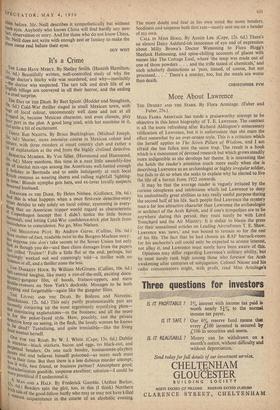More About Lawrence
THE DESERT AND THE STARS. By Flora Armitage. (Faber and Faber, 25s.) MISS FLORA ARMITAGE has made a praiseworthy attempt to be objective in this latest biography of T. E. Lawrence. The contrast is all the more refreshing after Richard Aldington's unnecessary vilification of Lawrence, but it is unfortunate that she mars the effect somewhat by an over-ornate style. This is a criticism which she herself applies to The Seven Pillars of Wisdom, and I am afraid she has fallen into the same trap. The result is a book which is a monument of devoted research but which grows steadily more indigestible as she develops her theme. It is interesting that she holds the reader's attention much more easily when she, is describing Lawrence as an archeologist or highly irregular soldier, but fails to do so when she seeks to explain why he elected to live the life of a hermit from 1922 onwards.
It may be that the average reader is vaguely irritated by the curious complexes and inhibitions whieh led Lawrence to deny his undoubtedly great abilities to any really useful purpose 'during the second half of his life. Such people find Lawrence the mystery man a far less attractive character than Lawrence the archeologist or architect of the Arab Revolt, and if one's sympathies are to lie anywhere during this period, they must surely be with Lord Trenchard and the Air Ministry. It is Unfair to blame the press for their sensational articles on Leading Aircraftman T: E. Shaw. Lawrence was 'news,' and was bound to remain so for the rest of his life. The fact that he had chosen an RAF barrack-room for his anchorite's cell could only be expected to arouse interest, not allay it, and Lawrence must surely have been aware of this.
Opinions may differ regarding Lawrence's military ability, but he must surely rank high among those who foresaw the Arab awakening after centuries of subjugation. Colonel Nasser and his radio commentators might, with profit, read Miss Artnitago's
book. But memories are notoriously fickle in the Middle East and the few who can still remember Lawrence are rapidly dwindling. Perhaps Lawrence himself would have preferred that this should be so, but the name 'Auruns' still has a touch of magic about it for the Bedouin. I remember discussing him with an elderly sheikh whose tent was pitched beside the wells at Bayir, the place where Lawrence first entered the deserts of Trans-Jordan after the long march from the Hejaz. The old man had ridden on many of Lawrence's forays against the railway and I thought his epitaph on Lawrence gave the lie to so much of the mud-slinging to which we have been treated recently. For in reply to my request for his opinion of Lawrence he replied quite simply, 'Of all the men have ever met, he was the greatest Prince.'
JAMES LUNT











































 Previous page
Previous page